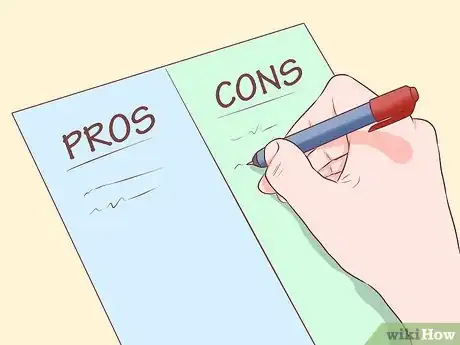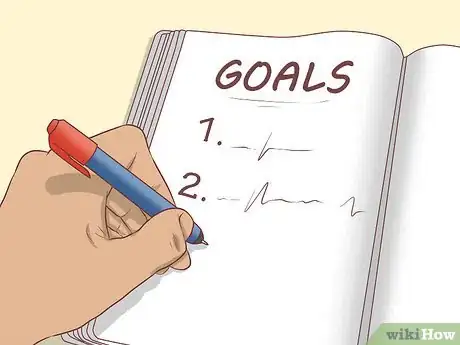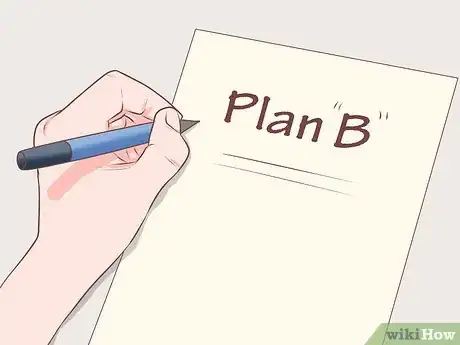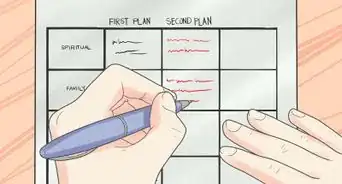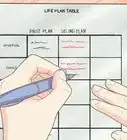This article was co-authored by Amy Chan. Amy Chan is a Relationship Coach and the Founder of Renew Breakup Bootcamp, a retreat that takes a scientific and spiritual approach to healing after the end of a relationship. Her team of psychologists and coaches has helped hundreds of individuals in just five years of operation, and the Bootcamp has been featured on CNN, Vogue, the New York Times, and Fortune. She has published a book on her work, Breakup Bootcamp.
There are 13 references cited in this article, which can be found at the bottom of the page.
This article has been viewed 105,739 times.
So things didn't go as planned, and what do you do now? Be patient. Know that the situation can get better and there are alternatives. By learning to adapt, you can feel more in control. Take the next steps to find out options available outside of your original plans. Avoid dwelling on what went wrong and focus on how you can change things for the better.
Steps
Being Flexible
-
1Keep your cool. Take a moment to breathe and calm yourself. We all experience roadblocks in life, and things don't always go according to plan. Avoid being hard on yourself or others. Getting upset will like not make the situation any easier. Take a step back for a moment.[1]
- Consider getting some distance from the situation for 30 minutes, 1 hour, or a day. Take a walk. Get a drink of water. Distract yourself with something positive.
- Try using some self-soothing activities to help you calm down, such as listening to your favorite album, reading a book, or engaging with a favorite hobby, such as knitting, playing guitar, or baking.
- Come back to the situation when you're able to be patient and calm.
-
2Acknowledge that you are disappointed. Once you have calmed down, you can begin to address the disappointment. The first thing you will need to do is to acknowledge that you are feeling disappointed.
- Try saying something like, “I am disappointed that this did not go my way.”
- You can also try writing about the disappointment. What did not go your way? Why is it upsetting you? How can you move forward from this disappointment?
- Acknowledging your feelings allows you to process them and move on. Avoiding or suppressing your feelings might feel good in the short term, but it will only make you feel worse later on.[2]
Advertisement -
3Assess what went wrong. Think about the situation from an objective standpoint. Avoid blaming yourself or others. Try to clearly see what happened.
- Your judgment may be clouded by negative emotions or stress. Instead listen to others that have a more objective view. Take a neutral approach.
- Your assessment should be based on the pros and cons of the situation. Evaluate both the good and the bad. Consider writing down the pros and cons of the event.
-
4Accept what you can and cannot control. Some things are simply out of our control. For example, if you made plans to travel for the weekend, and a storm hits, things may not go as planned. There are forces outside of yourself that influence and shape outcomes.[3]
- Avoid dwelling on things that you can't change, and focus on what you can.
- Think about how you can be a solution to a problem.
-
5Learn to adapt. Adaptation is key when things go awry. It is part of our evolution as people to learn to adapt to our environments. The more flexible you are in your plans the more likely your expectations of what you wanted will be met.[4]
- Life is not a straight and easy path. It is filled with twists and turns. Each day we are learning how to adapt to our daily lives and challenges.
- For example, imagine how you get to school or work. While there may be one specific way you do this, imagine the other possibilities available. Some routes may be easier and shorter, others may be longer or harder. But they still arrive at the same destination.
Assessing Your Options
-
1Explore what your expectations were. Sometimes we get frustrated when things don't go according to plan because they don't meet our expectations. Think about the expectations you had for the situation. Think about if your expectations may have been too strict or rigid.[5]
- One plan or goal is not a measure of your worth. Just because things didn't work out this time, that doesn't mean they will never work out in the future.
- For example, you and your friends wanted to go to a special restaurant, and you find out it's closed. You may be disappointed or upset because you were expecting a nice meal there. Instead of thinking that the only good meal is at this one restaurant, evaluate the other places available.
-
2Restate your goal. Since your original plan hasn't come through, return to your original mission or goal for the situation. You likely had a brainstorming phases about your goals and expectations. Go back to that moment.[6]
- Talk about your goal again with those involved.
- Consider writing down your original goal. Putting the situation in writing, particularly for bigger plans, can help to solidify what your goal is.
- Use this goal as a framework to restate and reimagine your alternative plans.
-
3Think about the options available. So your original plan hasn't worked out? Now is the time to think about the other options available. What is your Plan B or Plan C? If you don't have an alternative plan in place, then evaluate other options to consider.[7]
- Gather information about other options available. Consider writing down the other options available, and making a list of pros and cons.
- Reassess the strategies and possible outcomes to your plans. Talk with others involved in the process--friends, family, co-workers. See if they may have additional ideas.
- While these alternatives may not be your original plan, one or more of them may turn out as good as the original.
-
4Make a decision about next steps. Take action. Be clear about next steps you're taking. Avoid feeling defeated, as if the original plan was the best or only one available. Approach this next phase feeling positive and hopeful rather than negative.[8]
- Be confident in your decision once you've evaluated the different options available.
Coping with Change
-
1Build resilience. Having resilience means that you can keep working toward your goals even if things do not go your way. Building this skill takes time and practice, but it can help you to overcome disappointment more easily. To build resilience, you can:[9]
- Put things into perspective. When something does not go your way, consider if it is something that is worth spending time and energy on. For example, if you had hoped to get a job that you interviewed for and did not get it, then your time and energy might be better spent applying for different jobs. Take a moment to put your situation into perspective to help you build up your resilience.
- Maintain good relationships. If you have good relationships, then you will probably feel more secure when something does not go your way. Try to maintain healthy relationships with your friends and family to feel more secure during difficult times.
- Challenge unhelpful thoughts. Resilient people can alter their thinking to help themselves stay motivated and to continue working towards their goals. You can do this too by challenging thoughts that are untrue or unhelpful. For example, if you find yourself thinking, “I will always fail,” then you can challenge this untrue and unhelpful thought. Try telling yourself something like, “Things might not always go my way, but if I keep working towards my goals then I will achieve them.”
-
2Use the past for guidance rather than regret. The past is just that, the past. While you can't take back what has happened, you can use this experience as a helpful tool. Think about how the best and the worst of the situation for you or others you care about. What can you or others learn from this?[10]
- For example, let's say you're working an important project with a small team. Maybe the project is bigger than expected, and more time consuming than you thought? So the team ends up rushing to complete the project and it seems to you like the project is failing.
- This could be an opportunity to understand when to ask for additional help. Maybe you and the team could take a different approach to the project? Maybe the project isn't as bad as it seems because you had too high expectations?
- While this is all in hindsight, it's important to see what happens next as a way to grow.
-
3Avoid giving up. When something doesn't go the way you'd like, you may feel like you've failed. Avoid seeing yourself with hate, and instead focus on what you are thankful for. Resilience is key to keeping yourself motivated.[11]
- Giving up means giving into your own self-doubts.
- Reframe your negative thoughts by thinking about the good things that have happened. Even if they are small things.
- For example, if you were hoping to get an A on an exam and instead got a C, think about how you can look at the bigger picture. Maybe this is your only C on an exam this semester? Maybe this isn't the only test for the class so you can study harder on the other exams? Maybe the other students all got Cs on the exam too?
-
4Learn from mistakes. Life is trial and error. Some mistakes are our own, and some are those of others or simply forces beyond our control. Own up to your mistakes, but avoid dwelling in them. When you are honest with yourself, then you can learn to grow and become better.[12]
- Mistakes are learning opportunities. They can push you to the invisible boundaries of what's possible and what's not.
- When you try new things, it's possible you'll make mistakes. This is part of life. It can make you stronger and more prepared for the next time.
- Consider saying to yourself, "I know that I messed up, but it's not the end of the world" or "I can learn from this. I can be better. I can be ready for the next time."
-
5Ask for help. There's no shame in asking for input. Talk with people that you trust about what they think about the situation. Get advice from a variety of people.[13]
- Seeking advice can help you feel less alone with your thoughts or concerns.
- People on the outside might have a better vantage point about what's going on.
Expert Q&A
Did you know you can get expert answers for this article?
Unlock expert answers by supporting wikiHow
-
QuestionHow can I calm down in the moment?
 Amy ChanAmy Chan is a Relationship Coach and the Founder of Renew Breakup Bootcamp, a retreat that takes a scientific and spiritual approach to healing after the end of a relationship. Her team of psychologists and coaches has helped hundreds of individuals in just five years of operation, and the Bootcamp has been featured on CNN, Vogue, the New York Times, and Fortune. She has published a book on her work, Breakup Bootcamp.
Amy ChanAmy Chan is a Relationship Coach and the Founder of Renew Breakup Bootcamp, a retreat that takes a scientific and spiritual approach to healing after the end of a relationship. Her team of psychologists and coaches has helped hundreds of individuals in just five years of operation, and the Bootcamp has been featured on CNN, Vogue, the New York Times, and Fortune. She has published a book on her work, Breakup Bootcamp.
Relationship Coach Try the 4-7-8 Breathing Technique. Place the tip of your tongue on the roof of your mouth (right behind your front teeth) and breathe in through your nose for a count of 4 seconds. Hold your breath for 7 seconds, then release your breath from your mouth with a whooshing sound for a count of 8. Without a break, breathe in again for a count of 4, repeating the entire technique 3-4 times in a row, then resume normal breathing and activity.
Try the 4-7-8 Breathing Technique. Place the tip of your tongue on the roof of your mouth (right behind your front teeth) and breathe in through your nose for a count of 4 seconds. Hold your breath for 7 seconds, then release your breath from your mouth with a whooshing sound for a count of 8. Without a break, breathe in again for a count of 4, repeating the entire technique 3-4 times in a row, then resume normal breathing and activity.
References
- ↑ https://www.health.harvard.edu/mind-and-mood/staying-calm-in-turbulent-times
- ↑ Amy Chan. Relationship Coach. Expert Interview. 1 May 2019.
- ↑ https://www.psychologytoday.com/us/blog/what-mentally-strong-people-dont-do/201705/how-stop-worrying-about-things-you-cant-change
- ↑ https://www.psychologytoday.com/us/blog/sustainable-life-satisfaction/202009/learn-how-adaptation-is-key-embracing-change-and-growth
- ↑ https://www.apa.org/topics/stress/managing-expectations
- ↑ https://www.mindtools.com/pages/article/newHTE_90.htm
- ↑ http://muskie.usm.maine.edu/helpkids/pubstext/Four%20Stages%20Strategic%20Planning.pdf
- ↑ http://www.forbes.com/sites/amymorin/2014/03/17/change-doesnt-happen-overnight-it-happens-in-these-five-stages/#2bfd14696aeb
- ↑ https://www.apa.org/topics/resilience
- ↑ https://www.psychologytoday.com/us/blog/the-other-side-relationships/202102/there-are-no-mistakes-only-learning
- ↑ https://www.psychologytoday.com/intl/blog/fixing-families/201911/give-too-easily-how-persevere
- ↑ https://www.psychologytoday.com/intl/blog/shyness-is-nice/201904/3-keys-handling-mistakes
- ↑ https://www.psychologytoday.com/us/blog/tracking-wonder/202002/4-tips-effectively-ask-help-and-get-yes
About This Article
You can adjust when things don’t go to plan by taking a deep breath and giving yourself time to calm down before making any decisions. Try listening to your favorite album or reading a book to distract yourself. Once you’ve calmed down from your disappointment, start thinking about other options that are available to you. For example, if you wanted to go to a specific restaurant, but they’re closed, consider looking for a different restaurant that has the same cuisine. Or, if you didn’t get the job you interviewed for, consider how you might apply for similar jobs in the future. If you’re still struggling, try thinking about times in the past when your expectations weren’t met. Try to figure out what you did to move on and apply it to your current situation. To learn how seek advice to help yourself adjust, read more from our Counselor co-author.



